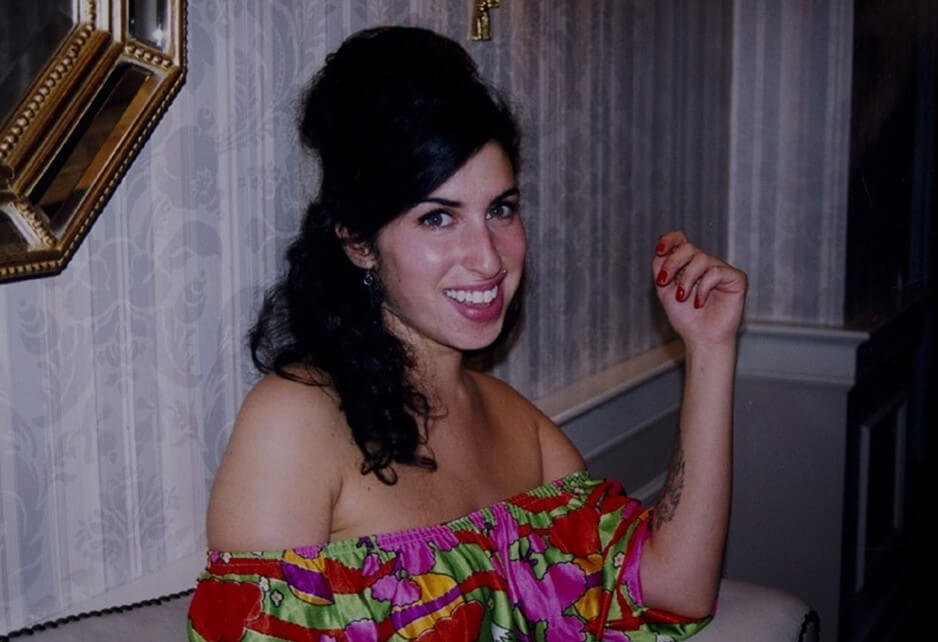Amy Winehouse’s Manager Nick Shymansky: “The 27 Club Needs to Disappear”
When Nick Shymansky was 19, he met a 16-year-old Amy Winehouse at a pub in North London. He was struggling to get a foothold in the music industry; she’d dropped out of high school to write songs. The two connected over a shared love of jazz and their Jewishness, which is rare in London. After she sent him a demo tape decorated with little hearts, Shymansky became Winehouse’s manager. Together, they eventually produced her first album, Frank.
Amy, the devastating documentary on the soul singer’s short life, couldn’t have been the truthful film that it is without the 12 hours of raw footage Shymansky provided the director, Asif Kapadia (Senna). Some of this is goosebump-inducing video of a young, eyeliner-free Winehouse singing in the studio; some is footage of her mugging and doing a Russian accent into a handheld camcorder. It’s these candid glimpses that allow for an honest portrayal of the funny, freakishly talented woman whose self-destruction was turned into a tabloid punchline. The film avoids, and indicts, the voyeurism and cruel mockery that characterized the 24/7 media coverage of Winehouse’s long struggle with addiction, depression, and bulimia. (In a clip that’s stomach-turning in hindsight, Jay Leno cracks jokes about her drug problems before hosting her on his show). But that doesn’t mean it’s whitewashed. Amy is unflinching in its look at the human being behind the smeared eyeliner and the beehive, and at the enablers who looked away from warning signs until her death from alcohol poisoning at age 27.
No one gets off easy here, especially not Winehouse’s ex-husband, who first introduced her to crack and heroin, or her father, who’s since distanced himself from the film. But Shymansky is one of the few who seemed to be genuinely trying to watch out for Winehouse. He was the guy who first tried to make her go to rehab, until her father derailed that plan, a turn of events we’ve all heard about in a great song.
We spoke to Shymansky about his relationship with Winehouse and her music, his hopes that the documentary will help shift the media and the public’s attitudes towards addiction and mental illness, and the danger of romanticizing the so-called “27 Club.”
There’s a part in the film where Amy describes how songwriting is her way of making something good out of pain. Did the making of this film serve a similar purpose for the people who were close to her, namely you and her two best friends?
It’s been quite healing being involved and going through the process of making the film. But I wouldn’t have ever gone out and looked for something like this to happen. This film had already been commissioned by the time myself and her two close friends eventually decided to get involved. So it was something we had to make a decision about along the way–about whether our input would be something positive for Amy’s legacy and positive for how people see Amy. That was the thought process. But I can’t say it hasn’t helped–it has. To talk and open up and go through that process. I think it’s been especially good for [Amy’s two closest friends], Juliet and Lauren. They were in a really bad place, they never sought therapy, so for them it’s been a really good thing. When you’ve known and loved someone and you see there’s something out there about them that’s being received as positive, that’s a really good outcome.
What was your relationship like with her as a manager?
I met her as a 19-year-old, she was 16. My family was in the music business, and I was really trying to prove myself and find someone I could really be passionate about and get involved with, and I met Amy. The passion and connection was there from the start. Our personalities clicked and we had a similar sense of humor and a real passion for music. So the relationship started very informal, and then eventually we got into making it official.
What was her songwriting process like?
Her songs were very much pages from her diary. To see someone that can make a song out of something going in their life is really impressive. She’d have these ideas in these diary entries and at right moment and time, she’d turn it into a song, which is why when you hear her music, it sounds so authentic and honest. Real experiences and thoughts became songs.
There are a lot of potential pitfalls this film largely avoids–it doesn’t romanticize Amy’s addiction and death the way the tabloids do. When providing the filmmakers with footage, how did you help make sure the film didn’t go in an exploitative direction?
I spent a lot of time with the director, Asif Kapadia, who directed Senna as well. He really gets to the soul of his subject. I would’ve trusted Asif with my life after getting to know him.
When you read about Amy in a tabloid or a magazine, you weren’t close to Amy–you were close to that’s that newspaper’s view on Amy. When you saw her through the lens of the paparazzi, you weren’t close to Amy, you were close to that paparazzi’s view of Amy. What the film does is it uses a lot of information and footage from people who were close to Amy, and so you’re getting a close take on her. The only reason I agreed for the footage to ever see light of day and be used in the film is that is when you get a true, pure, close look at Amy, you realize that the tabloids and the paparazzi painted a very warped picture.
When you get close to her, you realize she was brilliant, she was really intelligent, she was special. And most importantly, she got really ill–she got depressed. There were mental health issues, which no one ever questioned publicly. No newspaper ever came up with an article about, “Oh, we’re all very into this Amy Winehouse circus–is something wrong?” It was all “Oh look, she’s fucked.” For me, the film hopefully gets people in the media and the public to go, “Shit. Shit. We didn’t really go into this the way we should have.” Hopefully it gives a better perspective on Amy for her personal legacy. And maybe there’s a bit more of a question in the air about anyone suffering from depression and addiction.
So you think the film can help push forward conversations about depression and addiction, help people better understand mental health issues and reduce stigma?
I think the very fact you’re asking me that means the answer is yes. I already feel there’s a tone that’s a bit warmer towards Amy. I’m realistic — I don’t think all of a sudden the world’s gonna change, that the paparazzi are gonna calm down or that that the media is not gonna hound people that are in trouble, but there’s a bit more intellectual thinking going on out there. If that changes it by half a percent, or if the next time someone’s really in a bad way, it causes a bit more questioning, then I think the whole thing’s been worthwhile. I think this is making the best out of an awful situation, because quite frankly, the entire story is negative.
The other thing I hope happens is that this whole “27 Club” thing starts to disappear, because that’s really fucking dangerous. If you’re a depressed 18-year-old that’s feeling like you don’t really belong, and there’s this romantic band called the 27 Club, that’s a really negative thing to have out there. It’s not a club. A club is somewhere where you belong, where you’re with people, you know?
Do you think reporters and the entertainment industry will learn any lessons about that kind of romanticization? Personally, I almost feel gross interviewing you, because the media in the film comes off as so parasitic.
I don’t think that about reporters. I think that about tabloids. Tabloids are so influential in this country. The Sun, which is the biggest newspaper, was the same group that were tapping all our phone calls, hacking into email accounts, all those things. That same newspaper had a barometer in the showbiz column called the Winometer, which used to measure up how celebrities were faring in terms of their fuckups and alcohol intake in comparison to Amy. And it’s things like that that made her a joke–she wasn’t a joke.
Members of Amy’s inner circle, in addition to the media and the public, come off as leeches and enablers. But it doesn’t feel like Kapadia is pointing any fingers–they incriminate themselves. I know that Mitch Winehouse, Amy’s father, has distanced himself from the film and says it’s not a fair portrayal, though he helped get it off the ground. Do you think his reaction is justified?
I think no one ever likes to come out in a bad light. He’s a guy that’s lost his daughter. It’s extremely sensitive. But I think deep down, even he knows there were some terrible judgments made along the way that didn’t do anything positive for Amy. It’s a really tricky part of the film.
Do you think anyone was really acting in her best interest?
Not towards the end, no. If there were a few more people that made Amy their priority as opposed to the fruits of Amy their priority, maybe it would have ended differently. I think her two girlfriends would’ve done anything–anything–to save her. And I think that they’re probably the only two people that really would’ve done anything.
What do you hope this film does for her legacy as an artist?
I think her legacy is going to take 20 years to properly form. Hopefully she’ll have a great legacy as someone that was brilliant and looked amazing and had something to say, and who got lost and made a few bad decisions, as opposed to someone that’s a joke. Hopefully, she can be left alone for 15 or 20 years. Hopefully, with the film, people that were close to her are forced to rethink some of their actions. I hope that, in time, it all becomes less of a soap opera.
Follow Carey Dunne on Twitter @CareyDunne
You might also like 





















